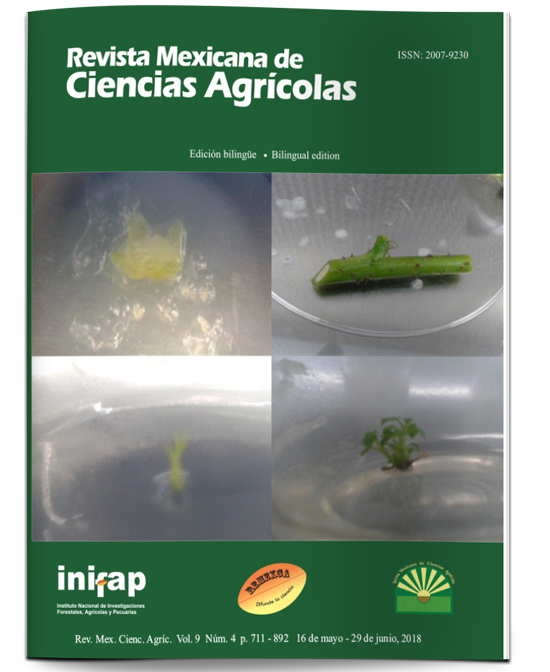Performance and adaptation of opaque black bean genotypes in environments with and without terminal drought
DOI:
https://doi.org/10.29312/remexca.v9i4.1399Keywords:
Phaseolus vulgaris, water stress, precocity, yieldAbstract
The drought at the end of the reproductive stage (terminal), is one of the main environmental factors that limit the yield of beans in the sowings of residual moisture in Veracruz and Chiapas, Mexico. The objective of this research was to determine the yield and adaptation of 13 bean genotypes under conditions of residual moisture in localities with and without terminal water stress. The new Verdín variety, together with 10 advanced lines and the Negro Tacaná and Negro Jamapa varieties were evaluated in three environments of Veracruz and Chiapas in Autumn-Winter (A-W) of 2013 and spring-summer (S-S) of 2014. The experimental design was complete random blocks with three repetitions. During the crop cycle, rainfall was recorded and the dynamics of the usable humidity of the soil was determined. The response variables were: days at physiological maturity and grain yield. Combined analyzes of the six test environments were carried out and also an analysis to determine the stability of yield and adaptation of the genotypes. The dynamics of the usable humidity indicated that, in Medellin and Ocozocoautla, in A-W of 2013 and in Medellin and Cintalapa in S-S of 2014, conditions of terminal drought prevailed, while in Tlapacoyan, in both production cycles, the plants had no stress by humidity. Thus, the differences in moisture availability during the reproductive stage, through the test locations, affected the productive response and the duration of the crop cycle of the genotypes evaluated. Among the genotypes, the Verdín variety showed high yield with and without terminal drought with 1121.7 and 1568 kg ha-1, its yield was significantly (p> 0.01) higher than that of the commercial controls, Negro Tacaná and Negro Jamapa.
Downloads
Downloads
Published
How to Cite
Issue
Section
License
The authors who publish in Revista Mexicana de Ciencias Agrícolas accept the following conditions:
In accordance with copyright laws, Revista Mexicana de Ciencias Agrícolas recognizes and respects the authors’ moral right and ownership of property rights which will be transferred to the journal for dissemination in open access. Invariably, all the authors have to sign a letter of transfer of property rights and of originality of the article to Instituto Nacional de Investigaciones Forestales, Agrícolas y Pecuarias (INIFAP) [National Institute of Forestry, Agricultural and Livestock Research]. The author(s) must pay a fee for the reception of articles before proceeding to editorial review.
All the texts published by Revista Mexicana de Ciencias Agrícolas —with no exception— are distributed under a Creative Commons License Attribution-NonCommercial 4.0 International (CC BY-NC 4.0), which allows third parties to use the publication as long as the work’s authorship and its first publication in this journal are mentioned.
The author(s) can enter into independent and additional contractual agreements for the nonexclusive distribution of the version of the article published in Revista Mexicana de Ciencias Agrícolas (for example include it into an institutional repository or publish it in a book) as long as it is clearly and explicitly indicated that the work was published for the first time in Revista Mexicana de Ciencias Agrícolas.
For all the above, the authors shall send the Letter-transfer of Property Rights for the first publication duly filled in and signed by the author(s). This form must be sent as a PDF file to: revista_atm@yahoo.com.mx; cienciasagricola@inifap.gob.mx; remexca2017@gmail.
This work is licensed under a Creative Commons Attribution-Noncommercial 4.0 International license.



